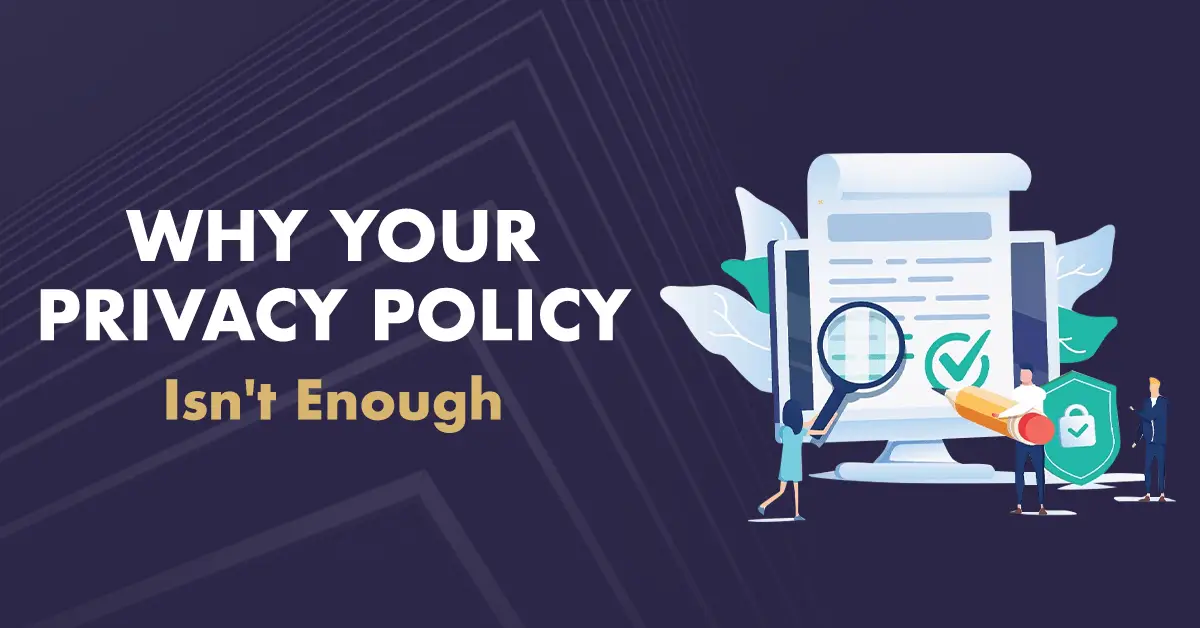Why Your Privacy Policy Isn’t Enough to Satisfy the GDPR


As details of the GDPR became more widely known, companies around the world that had previously feared losing business in Europe began to relax. The new stipulations on privacy policies, GDPR definitions, customers’ rights, and other basic measures weren’t that bad after all. Making several key changes would keep business owners largely in the clear. But as initial worries died down, some companies relaxed a little too much and made only minimal changes. Several only worked on making their privacy policy GDPR-compliant. Was your company one of them?
Privacy Policy GDPR Requirements
The GDPR requires several key things from a company:
- A clear privacy policy
- Documented legitimate reasons to collect and retain customer data
- Obtaining consent (or permission at minimum) to collect and retain customer data
- Keeping customers informed of what data is collected, how long it is kept, and how it is used
- Allowing customers to exercise their right to be forgotten without jumping through hoops
- Making a “good faith” attempt to follow every detail of the GDPR
At first glance, it may seem like just updating your privacy policy will satisfy these requirements. Some companies stop here. However, even the most well-written privacy policy in the world isn’t enough on its own. Let’s take a look at why.
What Makes a Privacy Policy GDPR-Compliant?
The GDPR places strict guidelines on privacy policies. First of all, the policy must be written in a straightforward manner, with no “legalese”. It cannot go on and on forever with fine print that would take hours to read. Anyone should be able to read your policy quickly and walk away with a detailed understanding of how your company handles their data.
Second, a privacy policy that’s hard to find is a red flag. Remember, the ultimate goal of the GDPR is transparency. If a company goes out of their way to hide their privacy policy, that indicates that it outlines data collection practices customers won’t like, so they just hope no one notices. It’s impossible to overemphasize how much of a bad idea this is.
Third, your privacy policy cannot automatically assume consent anymore. The GDPR requires that customers give explicit consent for you to collect and use their data. Provide a clear way for your customers to decide for themselves.
Fourth, as you rewrite your policy, take stock of every privacy law you may be subject to. The GDPR is the most famous but is far from the only one. For instance, Canadian customers are covered by the CASL and Californians by the CCPA. Recently passed laws in Virginia, Nevada, and New York show that the rest of the country is following California’s example. Include clauses that address each of these laws and explain how you comply with them.
Data Privacy Best Practices
It’s easy to dismiss the GDPR as merely requiring an update to your privacy policy. On the opposite extreme, it’s also easy to feel overwhelmed by the long list of new regulations. Either scenario can result in your company failing to fully comply and cost you a pretty penny in fines. To avoid either pitfall, it’s time to adopt these best practices for customer data privacy:
- Review the GDPR definition of “personal information”. You may be collecting too much or not properly handling what you already have.
- Focus on the customers’ best interests and consent rights, not yours. Your first priority shouldn’t be avoiding a lawsuit or fines for violating the GDPR. Your focus should be on keeping your customers happy with how you’re handling their data.
- Be transparent with your customers. Make it easy for them to find out what data is being collected and how you’re using it.
- Focus on data security. Privacy and security are related concepts, but they aren’t identical. Your customer’s data must stay safe while in your possession.
- Use privacy software that updates with new legal requirements. A flexible system will allow you to respond quickly to any new changes on the legal side of things.
4Comply Can Help!
In a world of constantly changing privacy laws and enough legal fine print to fill a library, simply keeping track of your obligations is a full-time job. Even the smallest change could mean restructuring a significant portion of your system. Fortunately, you don’t have to handle it all yourself. Updating your privacy policy might not be enough to satisfy the GDPR and other privacy laws, but here’s something that can: 4Comply.
4Comply is privacy compliance software that helps you handle consent management and fulfill privacy rights requests. But 4Comply isn’t just a packaged software solution: it’s also customizable using the Developer API. A few small tweaks will make 4Comply compatible with existing forms and applications you’re already using or, better yet, adjust its functions to support new or changed privacy laws. Data privacy compliance has never been easier!
Ready to streamline your privacy compliance needs? Get in touch with us today to learn how 4Comply can make your job easier.





